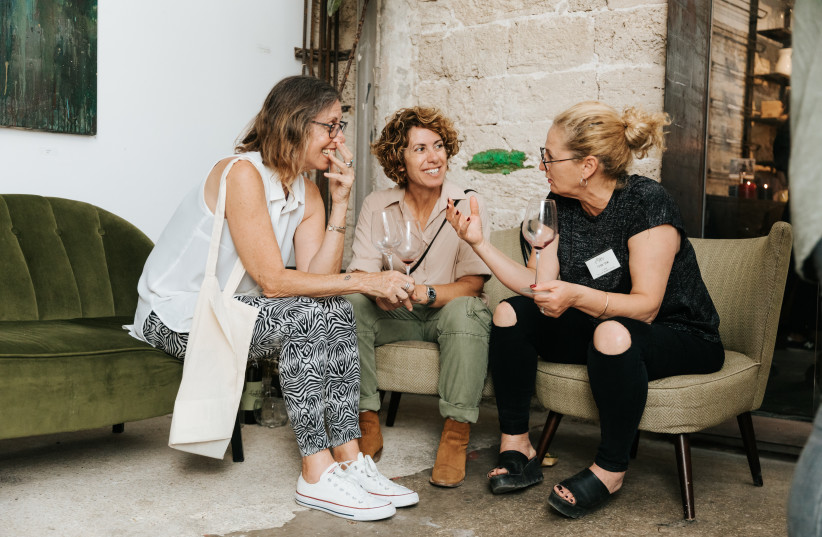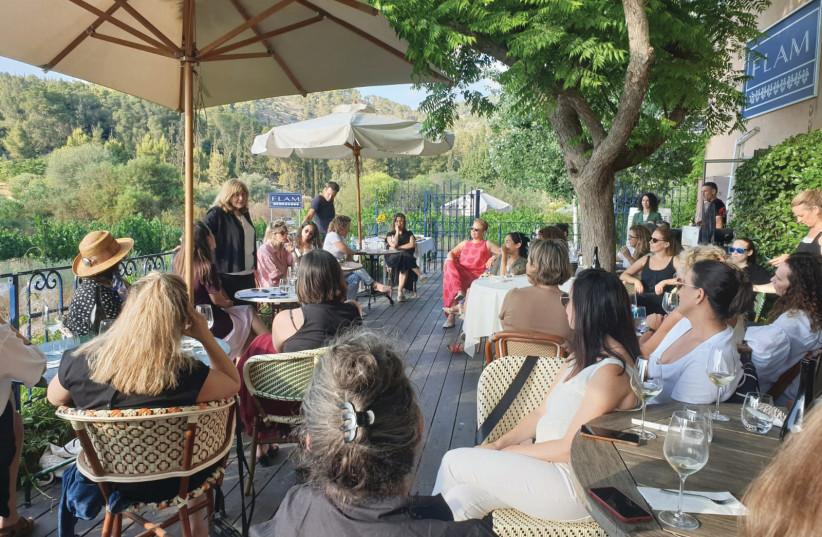When I arrived in Israel, women did not work in wineries.
In the production part of the winery, rabbis discouraged it so as not to distract from the spirituality of the men workers, even though there was nothing in Halacha to prevent it. On the sales side, it was also men only, because selling and schmoozing and occasionally lifting cases was seen as a man thing. While in the vineyard, where the work was physical, the very idea of women working was a definite no-no.
All that changed gradually over the last 40 years, and thankfully we live today in a different world. Women are Masters of Wine, famous sommeliers, winemakers, viticulturists and winery CEOs. Winery offices, wine stores and restaurants are full of female wine professionals.
In Israel, the pioneers in my mind are Tali Sandovski, winemaker of the Golan Heights Winery since 1986, and the late Carmi Lebenstein, sales and marketing manager of Carmel Mizrahi in the 1990s. Their success then should not be taken for granted today. It was far from a given that a woman could succeed in a chauvinist man’s world, and be given credit for the quality of their work, rather than standing out because of their gender.
Today we are in a different place entirely. The Golan Heights Winery employs three woman winemakers, and Barkan has two! The Golan Heights Winery & Carmel have both had female CEOs. Today the most prominent people marketing Israeli wines overseas are Dorit Ben Simon (Barkan-Segal), Etti Edri (Carmel-Yatir) & Yael Gai (Golan Heights Winery-Galil Mountain).
Possibly our most famous sommelier in Israel today is Mor Bernstein, winner of Pras Yarden (the Yarden Award for Wine Service). Shali Shalit Shoval is CEO of Domaine du Castel, one of our leading wineries. Michal Akerman is CEO & viticulturist of Tabor Winery, the fifth-largest winery in the country. Sharona Belogolovsky is owner-CEO of Vitkin Winery, one of our best small wineries. Nitzan Swersky of the tiny Ahat Winery is one of our finest winemakers. Winemaker-educator Roni Saslove is turning into our leading media wine personality. One of the most active and effective wine consultants, specializing in tourism and the business of wine, is Ilanit Tzemach.
Is it right to qualify each statement by explaining they are all women? It is rather demeaning to say “she is a great sommelier, especially as she is a woman.” No, she is a great sommelier, period. Their success is not because of their gender, but because they are at the top of their profession. Sheryl Sandberg has been quoted as saying: “In the future there will be no female leaders. There will just be leaders.”
Not everyone is in the spotlight like a Bernstein, Akerman or Saslove. There are many women working quietly and efficiently under the radar.
My daughter Rachel Montefiore Nataf (already 13 years in the wine trade) would agree with that. She used to work for Tulip Winery. She told me the senior management of the winery were women, but they are not among those who are in the front line of self-advertisement.
For example, Lotan Weissman, VP Marketing & Export and Lital Roth (Marketing, Visitors Center, Customer Relations) do not preen themselves for the next photo, they just get the job done, professionally, without bells and whistles. There are many, many women like this already working in wine. Things are probably better than they have ever been, but the situation could still be improved.
That was why Tal Tauber Gottesdiner came to the fore. Her wine background is that she worked for the W School for three years. This is the Israeli arm of the famous WSET in London, the most famous wine school in the world. Tal was the one behind the scenes that kept everything working, playing an important part in the success of the school.
While pregnant during the frustrations of corona, Tauber Gottesdiner came up with a gem of an idea. She saw all these people studying wine together, but was surprised no one knew each other. Already a feminist, she could not help noticing that of all the students, approximately 50% were women. She understood the networking potential, so she decided to found a sisterhood of those working in wine to help strengthen one another. It was important for her that it was open for anyone, not just the famous winemakers and sommeliers.
Tauber Gottesdiner called it Hashizra, which means “the stem,” totally appropriate as it is the stem that holds everything together. It supports and connects the fruit, flowers and leaves. She chose a beautiful logo and went live on Facebook in February. As if a vinous and feminine Pied Piper of Hamlin was passing by, it proved an enormous attraction. More and more people came out of the woodwork than she could possibly have imagined, and from all over Israel.
The only thing in common was that they were women, and involved in some way with wine. The response was not limited to young people only but to all age groups. Some had achieved great things in wine, but no one knew about it, and others were wine-wanna-be hopefuls. The registration swiftly swelled into the many hundreds, far more than was originally envisaged. A logo, Facebook page, Instagram presence and website appeared in no time, and a series of events were organized.
I could not help noticing how clear was Tauber Gottesdiner’s leadership, administration and organization, and though she took advice from friends and colleagues, she was the driving force and main decision-maker. She seemed to relish taking most of the responsibility.
I decided to meet Tauber Gottesdiner to find out more. She responded to my questions in a measured, reserved and disciplined way. I had the feeling she was holding herself back in a way, almost like a lawyer waiting for an opportunity. That is until she started talking about woman’s rights or wine, in which case she opened up and you could see the drive and passion for a cause for the first time. When she gets going, she is fluent and has a lot to say.
I tried to get through Tauber Gottesdiner’s guard to find where her efficiency and drive came from. I got through the formal front only when I rudely asked if she was OCD. She was a bit taken aback, laughed in shock and surprise, and answered coyly: “No, I just like to do things right and fine.”
Tauber Gottesdiner is clearly now one of the leading figures in the Israel wine bubble, representing the new, young generation, though she was very swift to make clear: “This is not just all about me.”
Tauber Gottesdiner is visible and influential, and not a shrinking wallflower. When she wrote an article listing 20 leading women in wine in the excellent culinary magazine Shulchan, she had no compunction about adding herself to the list of names, putting herself among the others, most of whom had many more years’ experience in wine. It was bold and showed great self-confidence.
Tauber Gottesdiner is someone who has not worked at a winery or been a sommelier, and she is comparatively new to wine, but because of the founding of Hashizra she deserved to be there. What I did learn from this and other articles she has written is that she is a fine writer. I hope she will do more writing in the future.
Maybe Hashizra was waiting to happen. The move was successful because the time was ripe and the execution was slick and professional. Being smart and good at publicity, Tauber Gottesdiner has certainly created a significant movement in Israeli wine.
By promoting women, Tauber Gottesdiner believes that she is advancing wine culture. “We are privileged to live at a time where human culture is changing for the better,” she said.
I could give a few examples where this was not so, but in terms of the emancipation and involvement of women in Israeli wine, she is right.
“We managed to create a new space that did not exist before,” she says. “Woman from all corners of the wine trade can now talk to each other directly. There is an open and honest dialogue in which joy, challenges and difficulties can be expressed, and it can be used for advice and inspiration.”
One of the first events organized by Hashizra was an exclusive visit to Flam Winery. Even wine insiders are not familiar with the extraordinary contribution of the matriarch Camellia (Cami) Flam in the development of Flam Winery. She was the mastermind with the financial experience who steered winery to where it is today. She is a real role model, but has never spoken publicly… until the event organized by Hashizra, when she was given the platform to share her experiences. It was a powerful example of how worthwhile Hashizra events could be.
Tauber Gottesdiner quoted to me a graffiti which read: “When women support women, wonderful things happen.” I recently went to a performance of comedian Lior Shlein. He is a master of presenting some searing home truths wrapped up in flippant comedy. He said something like (and I paraphrase from memory): “Women will need to be feminists until men become feminists, then it will no longer be necessary.” It is so true.
I applaud Tauber Gottesdiner’s initiative, and welcome Hashizra as an important addition to our mini world of wine, and wish them continued growth and future success. There is no doubt in my mind that any men-only activity, whether religion, politics, business or wine, is enhanced by women being part of it. Certainly, a winery, restaurant or wine shop would not be complete without the involvement and input of women.
Tauber Gottesdiner invests a ton of time in the success of Hashizra, much of it without the knowledge of others. She is quick to encourage, prompt and support from behind the scenes, while at the same time being quite visual and up front. No one can doubt that this is her creation and her baby, and she certainly has the drive and personality to continue to take Hashizra forward. She just has to beware it does not become too commercial and frivolous.
In the meantime, she has all sorts of plans for the future. “If we work together, the entire industry will advance, based on a shared love of wine, creating a world where wine culture is simply culture,” she says.
I’ll drink to that!
The writer is a wine industry insider turned wine writer, who has advanced Israeli wines for 35 years. He is referred to as the English voice of Israeli wine.


